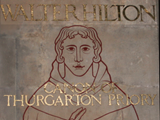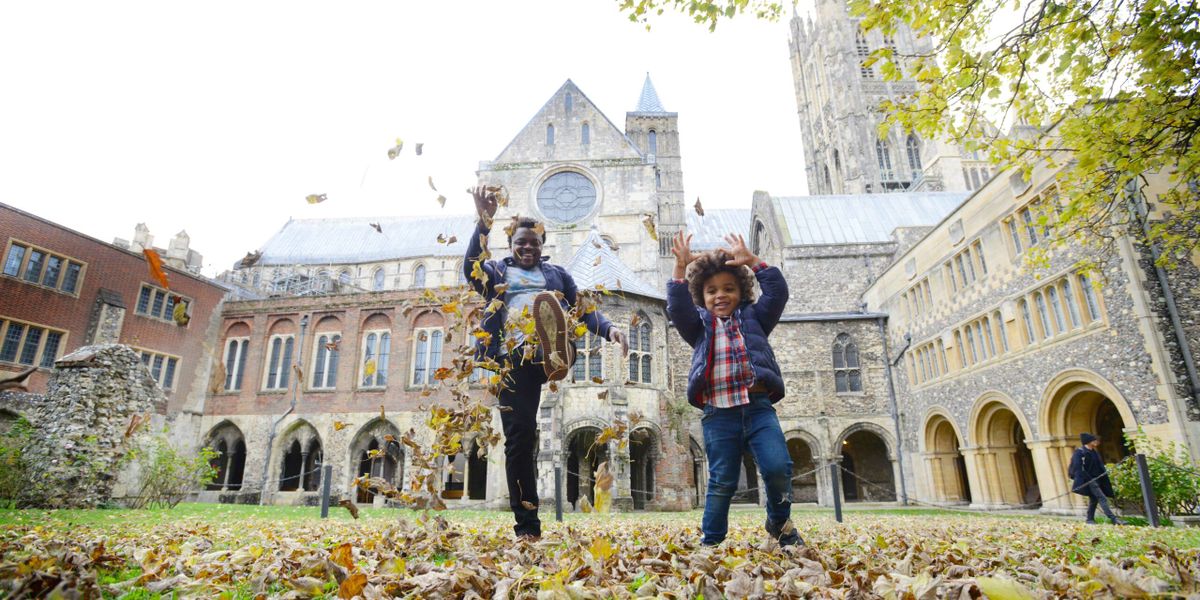- What do you make of these first 23 chapters of The Ladder of Perfection?
- What do the words ‘contemplative life’ mean to you?
- In what way is the contemplative life related to contemplative prayer and how do they differ?
- Does the ‘enclosed or solitary life have any relevance today?
- Do you agree with Hilton’s warning against reliance on physical experiences as a measure of the spiritual life.
- What does Hilton mean by the word humility, is it different to how we understand it today?
- To what extent is Hilton’s guidance helpful in your spiritual life?
On Christmas Day (25th Dec) the Cathedral will be open for services of worship only (no sightseeing entry). The Precincts will be open to all, free of charge, from 0700 to 2100.
On Boxing Day and New Year’s Day, we will be open for sightseeing from 1000 to 1700 (last entry at 1600).
Planning your visit? Check our opening times and upcoming closures.
*UPDATE* Please note, there will be no service of Said Evening Prayer at 4pm on 23rd or 24th December.
Apologies for the inconvenience.
ONLINE BOOK GROUP
The Ladder of Perfection by Walter Hilton (1340-1396)
SESSION RECORDINGS AVAILABLE
This book group has now concluded, but you can still watch the session recordings to read and reflect on the text in your own time.
Walter Hilton is widely regarded as the first among medieval English mystics, and The Ladder has provided continuous inspiration since its appearance six centuries ago.
It is addressed to a ‘ghostly sister in Jesus Christ’ (a solitary and probably well known to the author) and was written to be of immediate practical help to her in her struggle for spiritual growth.
It’s ever-topical theme is that of the search for God through contemplation, and the gradual progress of the soul through purgation to illumination and union. Walter Hilton describes this journey with great insight, in language of considerable beauty and simplicity. Under his guidance modern readers, whose talent for prayer is lying fallow and buried, will discover how to unearth it and develop it into a source of joy and strength.
Together, over eleven weeks, we read and discussed the complete text - focussing on specific chapters each week.
We read the Penguin Classic version, translated by Leo Sherley-Price. This book is out of print so the relevant chapters have been uploaded onto our website so you can read them.

Each week Canon Emma began with a brief introduction followed by discussion and then concluded with prayer.
Week One - 7 January: Book I, The Contemplative Life: Chapters 1 - 23
Week Two - 14 January: Book I, On prayer and meditation: Chapters 24 - 44
Week Three – 21 January: Book I, Searching for Jesus: Chapters 45 - 61 -
Week Four – 28 January: Book I, Rooting out Sin: Chapters 62 - 76 -
Week Five – 11 February (rescheduled from 4 February due to sickness): Book I, Looking Within: Chapters 77 - 93
Week Six - 25 February: Book II, Reflecting the Image of God: 1- 9
- Session reading (please read prior)
- No session recording, due to technical difficulties
Week Seven - 4 March: Book II, The Reformed Soul: Chapters 10 - 20
Week Eight - 11 March: Book II, The Pilgrim Path to the City of Peace: Chapters 21 - 26
- Session reading (please read prior)
- No session recording, due to technical difficulties
Week Nine - 18 March: Book II, The Radiant Darkness: Chapters 27 - 33
Monday 24 March - The Feast of Walter Hilton
Week Ten - 25 March: Book II, Love Himself: Chapters 34 – 40
Week Eleven - 1 April: Book II, The Special Grace of Contemplation: Chapters 41 - 46
ONLINE BOOK GROUP: The Ladder of Perfection by Walter Hilton (1340-1396)
Session Recordings
These recordings include Canon Emma's introductions for each session, and 'questions to ponder'.
Questions to ponder - Week One (Book I, The Contemplative Life: Chapters 1 - 23):
Questions to ponder - Week Two (Book I, On prayer and meditation: Chapters 24 - 44):
- In what ways does knowing something about the author help in your reading of The Ladder of Perfection?
- Do you resonate with any of the levels of prayer that Hilton describes?
- How is his advice relevant to today?
- How do you understand the word ‘temptation’?
- What would you say is your biggest temptation in the spiritual life and why?
- What do you think of the argument in chapter 44 that those who do not love the name of Jesus in this life will be excluded from the joys of heaven?
Questions to ponder - Week Three (Book I, Searching for Jesus: Chapters 45 - 61):
- What do you make of this section of the book?
- Do you find Hilton’s guidance useful and in what ways?
- What do you find in his writing that is less helpful?
- How is Hilton using scripture in his work?
- What do you make of Hilton’s image of the rivers of sin and their blockages?
- What does Jesus mean to you?
Questions to ponder - Week Four (Book I, Rooting out Sin: Chapters 62 - 76):
- How do you respond to these chapters on the image of sin?
- In what ways is Hilton’s description of the different manifestations of sin useful?
- Have you ever been to confession and did it help?
- How do you cope with some of the thoughts and actions that Hilton describes?
- What helps you in self-reflection?
- In what ways could Hilton’s writing be helpful to people today but religious and non-religious?
Questions to ponder - Week Five (Book I, Looking Within: Chapters 77 - 93):
- Do you agree with Hilton’s closing words that this book is only for contemplatives and if not, why?
- How is his advice relevant to today?
- How do you understand Hilton’s notion of the image of Jesus?
- In what ways can understanding the senses as windows be helpful?
- Looking back over this first book what have you found most useful and what have you found of least use?
- What will you take away with you?
- Can you imagine why the contemplative asks Hilton to write more?
Questions to ponder - Week Six (Book II, Reflecting the Image of God: 1- 9):
- What do you make of the beginning of Hilton’s second book?
- How does Hilton’s second book relate to the first book?
- What struck you about these opening chapters?
- What do you think Hilton means by the word ‘reformation’ ?
- What is your experience of the sacrament of Baptism and of the sacrament of Penance?
- How do you understand the phrase ‘made in the image and likeness of God’?
- In what ways could Hilton’s writing be helpful to those who see themselves and spiritual but not religious?
Questions to ponder - Week Seven (Book II, The Reformed Soul: Chapters 10 - 20):
- What did you notice about these chapters?
- Did any of Hilton’s words resonate with you and why?
- How do you understand Hilton’s idea of the ‘reformation of faith’ and ‘reformation of feeling’?
- What do you think Hilton means by the word ‘reformation’?
- Have you ever felt weighed down by your sins?
- What is the significance of Jesus in the reformation of the soul?
- As we begin Lent tomorrow, how could you grow in your life of prayer?
Questions to ponder - Week Eight (Book II, The Pilgrim Path to the City of Peace: Chapters 21 - 26):
- How do you respond to these chapters on the reformation of feeling?
- In what ways is Hilton’s description of the pilgrimage to Jerusalem useful?
- Have you ever experienced what Hilton is speaking about?
- What images are most helpful for you?
- What does Hilton mean when he tells us to desire or long for Jesus?
- In what ways could Hilton’s writing be helpful to people today who are spiritual but not religious?
Questions to ponder - Week Nine (Book II, The Radiant Darkness: Chapters 27 - 33):
- In what ways do you understand what Hilton is talking about in these chapters?
- Do you resonate with any of the levels of prayer that Hilton describes?
- How is his advice relevant to today?
- What images are most helpful for you?
- What does Hilton mean by the phrase ‘reformation of feeling’?
- Is the spiritual life one of progressive stages?
- Why do you think it might be important to develop the inner, spiritual life?
- How would encourage someone else to read Hilton’s text and why?
Questions to ponder - Week Ten (Book II, Love Himself: Chapters 34 – 40):
- What do you make of these chapters?
- Do you resonate with any of Hilton’s mystical teaching?
- How do understand the Trinity and what relevance does this have for your life?
- What is the relationship between contemplative, ‘silent’ prayer and the contemplative life?
- How do understand John’s words ‘God is Love and those who live in love live in God and God lives in them’?
- In what ways is Hilton’s understanding of the contemplative life open to everyone or just to some?
Questions to ponder - Week Eleven (Book II, The Special Grace of Contemplation: Chapters 41 - 46):
- What does the word ‘grace’ mean to you?
- Do you resonate with any of Hilton’s mystical teaching?
- Where do you think works and service fit in with Hilton’s spiritual teaching?
Looking back on this book group:
- What have you enjoyed about it? What will live with you? How has it helped or hindered in your own spiritual life? What has surprised you?
- What have you found most difficult and will lay aside?
- What has it been like reading a fourteenth century text, do the words of yesterday still relate to today?
ONLINE BOOK GROUP: The Ladder of Perfection by Walter Hilton (1340-1396)
Supporting Resources
Following on from the series 'Julian of Norwich: a medieval take on lockdown and how to survive it', Canon Emma Pennington released 6-part series 'The English Mystics: their relevance for us today' in June 2021.
This series focused on the unique group of devotional writers at the end of the fourteenth century called The English Mystics. Each wrote from a different background and perspective but all spoke to a burgeoning lay audience about the life of faith and prayer.
It outlined who they are as a group and what their individual lives and writings have to say to us today which can be surprising relevant and rewarding.
The English Mystics - Episode Three: Walter Hilton
Watch this episode from Canon Emma's 6-part series, released in June 2021
For future suggestions of spiritual books for the group to read please email Canon Emma at [email protected]

